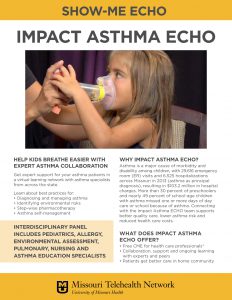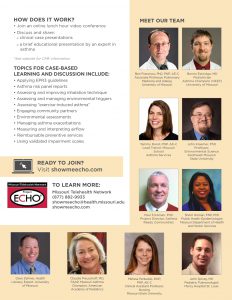Enroll now! Join on your lunch hour for CE, CME or MOC credit. Download the Asthma ECHO brochure Asthma -combined- ECHO flyer
There is NO cost to participate!
- Asthma Ready® Communities (ARC) is partnering with the Missouri Telehealth Network to offer three workforce development programs to improve asthma care across Missouri communities. Each of these Asthma ECHO (Extension for Community Healthcare Outcomes) programs is a learning collaborative utilizing problem-based approaches for solving everyday challenges, including workflow.
- To learn more about the international ECHO program go to http://echo.unm.edu/.
- Asthma ECHO® uses multipoint Zoom videoconferencing technology. Enroll now at Asthma – Show-Me ECHO and indicate if you seek CME (Category One), MOC Part 2 (Pediatrics), MOC Part 4 or CE credit for the ECHO sessions. You will receive a survey to complete in May and one at the end of October to verify your participation and earn continuing education credit.
- To see which asthma best practices you can adopt through Asthma ECHO complete a self-assessment at Asthma Care — Routine in My Practice
- Asthma 1 Essentials (Impact Asthma ECHO): This program includes eight, 1-hour weekly video calls featuring a case presenter, other learners and an expert support team. Asthma 1 Essentials is offered three times a year starting in January, May and September with a new case every week. After an open discussion recommendations are developed and shared with the presenter. Finally, a session moderator presents slides covering a key area of asthma practice. To register or learn more, visit Asthma – Show-Me ECHO
- Asthma 2 QI/MOC (Asthma Care Accelerator – ACA): This series of video calls is designed to enable providers to implement national asthma guidelines in their setting with a quality improvement strategy. There are eight, one-hour videoconferences (4 in April and 4 in August, Tuesdays noon-1 pm) with critical activities that satisfy American Board of Medical Specialties (ABMS) requirements for Maintenance of Certification (MOC) credit for health system change, clinical practice QI and physician lifelong learning. This approach is also suitable for advanced practice providers and school nurses aiming to improve asthma care. Performance feedback and practice facilitation are utilized for data-driven, on-site clinical support for best practices. To register or learn more, visit https://showmeecho.org/clinics/asthma-accelerator/.
- Asthma 3 Community (Asthma Care and Education – ACE): Root causes and solutions for uncontrolled asthma are often found outside the clinic walls. Addressing the unique challenges children and families face in the day-to-day experience of asthma requires a multidisciplinary team who shares understanding and a commitment to meet pressing needs. This program is dedicated to opening lines of communication between clinic and community partners for improved asthma care and outcomes. Care managers, health plans, clinicians, school nurses, community health workers, home environmental assessors, asthma educators, pharmacists, social workers and many others have vital roles. As we better understand one another, we will better serve our patients. Asthma 3 Community meets eight Tuesdays yearly from noon to 1 p.m. (in March and July). To register and learn more, visit https://showmeecho.org/clinics/ace/.
- Community clinicians and others who present cases benefit from working with an ECHO asthma champion who follows-up throughout the year to provide ARC training and support at no cost. https://asthmaready.org/training-programs/#ARC1
- Asthma Ready Communities (ARC) also offers stand-alone CME programs for your team meetings (clinic and school) to enhance the readiness of a wider circle of health care professionals to promote cost-efficient care that is compliant with Guidelines for the Diagnosis and Management of Asthma: Expert Panel Report 3. For parents and caregivers, ARC programs support strategies to improve asthma outcomes. https://asthmaready.org/learn-about-asthma/
- ENROLL NOW! For more information or assistance in registering, please call Julie Patterson at 573-884- 8629 or email her at julia.patterson@health.missouri.edu or email Ben Francisco at franciscob@umsystem.edu
Does this approach really work?
Take a look at Asthma ECHO Evaluation 2022_24
AsthmaECHOEvaluation2022_24Asthma Ready® Communities, University of Missouri School of Medicine, Pediatric Pulmonary Medicine, 400 N. Keene Street, MO 65201, Phone: 573-884- 8629; Fax: 573-882- 6126; email: Julie Patterson at pattersonjw@health.missouri.edu or Ben Francisco at franciscob@health.missouri.edu


